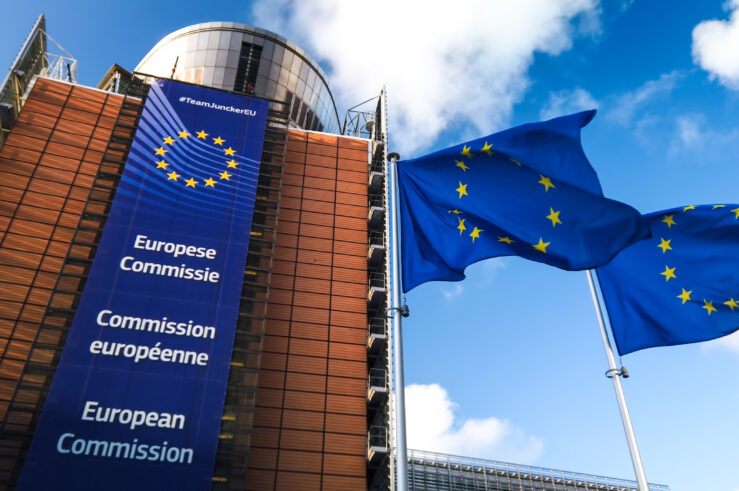Showing archive for: “EU”
Two FCC Commissioners Walk Into a Bar
Former FCC Commissioners Have Some Thoughts Writing with Kirk Arner in RealClearMarkets, Harold Furchtgott-Roth—formerly of the Federal Communications Commission (FCC)—comments on the Spectrum Auction Reauthorization Act, recently passed out of the House Energy and Commerce Committee. Arner and Furchtgott-Roth note that reauthorizing spectrum auctions is a “good and necessary idea,” but take issue with the “$23 billion Ponzi ... Two FCC Commissioners Walk Into a Bar
There’s Nothing ‘Fair’ About EU Telecoms’ Proposed ‘Fair Share’ Plan
The European Commission’s recently concluded consultation on “the future of the electronic communications sector and its infrastructure” was a curious phenomenon in which the commission revived the seemingly dead-and-buried idea of a legally mandated “sender pays” network-traffic scheme, despite the fact that it remains as unpopular and discredited as it was when last discussed roughly ... There’s Nothing ‘Fair’ About EU Telecoms’ Proposed ‘Fair Share’ Plan
Antitrust at the Agencies Roundup: Pruning the Data Tree Edition
In my last roundup, I puzzled over the Federal Trade Commission’s (FTC) suit to block Amgen’s acquisition of Horizon Therapeutics. The deal involved no product overlaps whatsoever (i.e., no horizontal competition), a target firm acknowledged to have no competitors for the orphan drugs at issue, and nobody poised to enter into competition either. I won’t ... Antitrust at the Agencies Roundup: Pruning the Data Tree Edition
If the UK Wants to Remain a Tech Leader, It Needs Less Regulation, Not More
Brexit was supposed to free the United Kingdom from Brussels’ heavy-handed regulation and red tape. But dreams of a Singapore-on-the-Thames are slowly giving way to ill-considered regulation that threatens to erode Britain’s position as one of the world’s leading tech hubs. The UK Competition and Markets Authority’s recent decision to block the merger of Microsoft ... If the UK Wants to Remain a Tech Leader, It Needs Less Regulation, Not More
UK Poised to Begin Realizing Brexit’s Regulatory-Reform Potential
The United Kingdom’s 2016 “Brexit” decision to leave the European Union created the opportunity for the elimination of unwarranted and excessive EU regulations that had constrained UK economic growth and efficiency. Recognizing that fact, former Prime Minister Boris Johnson launched the Task Force on Innovation, Growth, and Regulatory Reform, whose May 2021 report recommended “a new regulatory ... UK Poised to Begin Realizing Brexit’s Regulatory-Reform Potential
The AI Act and Regulatory Overaggregation
It appears that the emergence of ChatGPT and other artificial-intelligence systems has complicated the European Union’s efforts to implement its AI Act, mostly by challenging its underlying assumptions. The proposed regulation seeks to govern a diverse and rapidly growing AI landscape. In reality, however, there is no single thing that can be called “AI.” Instead, the category comprises ... The AI Act and Regulatory Overaggregation
If Necessity Is the Mother of Invention, New EU SEP Rules Are Decidedly Unnecessary
An unofficial version of the EU’s anticipated regulatory proposal on standard essential patents (SEPs), along with a related impact assessment, was leaked earlier this month, generating reactions that range from disquiet to disbelief (but mostly disbelief). Our friend Igor Nikolic wrote about it here on Truth on the Market, and we share his his concern that: As it currently stands, it appears the regulation will ... If Necessity Is the Mother of Invention, New EU SEP Rules Are Decidedly Unnecessary
Digital-Market Regulation: One Size Does Not Fit All
Regulators around the globe are scrambling for a silver bullet to “tame” tech companies. Whether it’s the United States, the United Kingdom, Australia, South Africa, or Canada, the animating rationale behind such efforts is that firms like Google, Apple, Meta, and Amazon (GAMA) engage in undesirable market conduct that falls beyond the narrow purview of antitrust law (here and here). To tackle these supposed ... Digital-Market Regulation: One Size Does Not Fit All
European Commission’s Leaked SEP Regulation Would Increase Costs for Innovators, Hurt EU Competitiveness, and Fail to Reduce Litigation
The European Commission is working on a legislative proposal that would regulate the licensing framework for standard-essential patents (SEPs). A regulatory proposal leaked to the press has already been the subject of extensive commentary (see here, here, and here). The proposed regulation apparently will include a complete overhaul of the current SEP-licensing system and will ... European Commission’s Leaked SEP Regulation Would Increase Costs for Innovators, Hurt EU Competitiveness, and Fail to Reduce Litigation
What the European Commission’s More Interventionist Approach to Exclusionary Abuses Could Mean for EU Courts and for U.S. States
The European Commission on March 27 showered the public with a series of documents heralding a new, more interventionist approach to enforce Article 102 of the Treaty on the Functioning of the European Union (TFEU), which prohibits “abuses of dominance.” This new approach threatens more aggressive, less economically sound enforcement of single-firm conduct in Europe. ... What the European Commission’s More Interventionist Approach to Exclusionary Abuses Could Mean for EU Courts and for U.S. States
When Bad Antitrust Costs Lives: The Illumina/GRAIL Tragedy
Regrettably, but not unexpectedly, the Federal Trade Commission (FTC) yesterday threw out a reasoned decision by its administrative law judge and ordered DNA-sequencing provider Illumina Inc. to divest GRAIL Inc., makers of a multi-cancer early detection (MCED) test. The FTC claims that this vertical merger would stifle competition and innovation in the U.S. market for ... When Bad Antitrust Costs Lives: The Illumina/GRAIL Tragedy
Reining in Digital Competition to No Good End: Will AICOA and OAMA Rise from the Grave?
The 117th Congress closed out without a floor vote on either of the major pieces of antitrust legislation introduced in both chambers: the American Innovation and Choice Online Act (AICOA) and the Open Apps Market Act (OAMA). But it was evident at yesterday’s hearing of the Senate Judiciary Committee’s antitrust subcommittee that at least some ... Reining in Digital Competition to No Good End: Will AICOA and OAMA Rise from the Grave?











